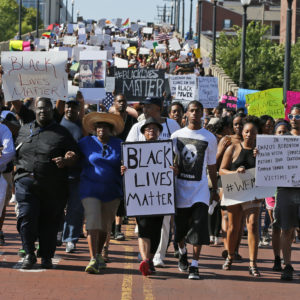Anger over the death of yet another black man, George Floyd, at the hands of a white police officer has erupted in violent protests coast to coast.
People looking for quick, easy answers will cling to that story. But it’s not the right story. The right story is more complicated, and it implicates nearly everyone.
The right story is partly rooted in the racial difficulties that have plagued the United States from slavery, to the Jim Crow South, to the strife of the 1960s, through the Rodney King fiasco — and now to George Floyd. Race is the elephant in every American room.
But instead of addressing it head on, we are subjected to the divisive election-cycle rhetoric of reparations, in which politicians tell hundreds of millions of Americans who never enslaved anyone that they should be forced to pay tens of millions of people who were never enslaved.
Add to this the consistent efforts of the intellectual elite, as with the New York Times’ 1619 Project, to paint the nation not as it is, warts and all, but as a villainous criminal enterprise only made possible by chattel slavery.
Lost on all of them is the fact that the United States, with its foundation of human equality, set hundreds of years of slavery on the path to extinction in just four score and seven years.
Sadly, this sort of narrative is not exclusive to race.
Every political disagreement we have is routinely presented in us-versus-them terms. It has gotten so bad that President Trump’s allies and foes alike seem relieved that he does not weigh in regularly on the violence engulfing the nation.
Most know that he would do more harm than good. Media outlets continue to fan the flames, only differing in which fractious group they appeal to as they do it.
And when all of this was combined in a cauldron of 40 million out-of-work and desperate people, told by their betters that, to stop COVID-19, they must forfeit everything in their lives that gave them security, a disaster of some kind was inevitable.
That officials high and petty didn’t stop to think of the unintended consequences that could emerge from their lockdown is to their shame. But why would they have bothered? None of them were ever in any danger of losing their livelihoods.
When genuine outrage produced mass protests, opportunists took to the streets to cause a smoldering situation to explode. The right blames Antifa; the left blames white supremacists. And we’re right back to demonizing each other.
It’s no wonder that everything exploded as it did.
As the police, coast to coast, beat back riots, we tend to focus on quelling eruptions rather than addressing their underlying causes. But so long as we fail to face what caused this violence, it can and will happen again.
On the positive side, we are finally seeing some contrition and empathy on the part of the police.
We have been conditioned to expect them to circle the wagons at times like this, but the quick charges brought against Minneapolis police officer Derek Chauvin, along with a good number of public statements, give some legitimate cause for optimism.
What happens next?
The circumstances that got us here are neither simple nor easy to address. But recognizing them is a good place to start. For decades, qualified immunity has protected police from the consequences of their misconduct. This has made policing an attractive profession for people with violent and racist tendencies.
In the quest for votes and ratings, politicians and the media have pitted Americans against each other by attributing to reasonable people on both the left and right the crackpottery of the fringes, convincing each group that the other is either stupid, evil, or both. For decades, politicians have gathered power to themselves by promising to solve all manner of problems that are beyond their capabilities. The result? A political class that rules rather than serves.
Unless we address these root problems — all of them — we can look forward to more of the same sorts of outcomes down the road. If ever there were a time to take stock of bad ideas, intentions and outcomes, it’s now.

